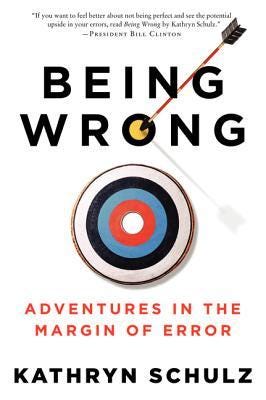Kathryn Schulz' Being Wrong - A Short Review
"To f*ck up is to find adventure."
I wasn't sure if I wanted to keep reading Being Wrong: Adventures in the Margin of Error until Schulz made this point at the end of chapter two. I thought all of chapter one and most of chapter two were too abstract and philosophical for my taste. But then, in the last pages of chapter two, she set the hook and both my highlighter and I were in. That's when she wrote about the medieval knight errant and reminded readers that the Latin word errare, meaning "to roam", gave rise to the English words "error" and "errand". The English word "errant" can be used to express either idea. But enough about etymology. To be errant is to be wrong but also to be on an adventure.
In this spirit, Schulz gives us the 'Cuz It's True Constraint: we believe what we believe because our convictions (we believe) are based on facts. We're willing to accept the general notion that our beliefs may be biased, but if we pick a particular belief, we'll probably say, "but not that one". We don't believe things because it makes us feel better, smarter, or more in control. That's what other people do. Wrong is something that other people do and they do it for the wrong reasons. Schulz points out that even when we do admit we were wrong, it immediately becomes past tense because we no longer believe the same thing. We were wrong.
So why do we make errors? Because our brains are really good at inductive reasoning. We learn language by hearing others conjugate a verb a few times then we go out and conjugate it the exact same way in all situations until someone points out that we say "took" instead of "taked". We are all built to work on assumptions and we don't realize when that gets us into trouble. As Schulz phrased it, "every one of us confuses our models of the world with the world itself" (p. 107).
We silently substitute how we think the world works for how it actually works and then quickly convince ourselves of the certainty of our model. So if my model is how the world works and I see that your model is different, then your model and, therefore, your world is wrong. I can see all the ways that your world is wrong but I can't see how mine is. I see your certainty as laughable but my own as righteous. (It is worth remembering that this book was published in 2010 and written earlier than that so we now have a decade of social media to show just how right Schulz is about how we treat being wrong.)
To me, the beauty of the book is that Schulz doesn't turn it into a how-to on not being wrong, nor does she pontificate. She writes an ode to and explanation of "wrongology". The closest Schulz gets to telling readers what to do about being wrong is suggesting that it is about far more than getting our facts straight.
But facing up to the true scope and nature of our errors is also (and more self-evidently) psychologically demanding. Crucially, these two challenges are inseparable: if we can't do the emotional work of fully accepting our mistakes, we can't do the conceptual work of figuring out where, how, and why we made them. (p. 207)
There is a vulnerability in being wrong and it scares the crap out of us. So fixing our mistakes means fixing ourselves as well as our facts. But Schulz describes an "optimistic model of wrongness" in which error is a force that "imperceptibly helps...us human beings - to grow up" (p. 289).
So what does this have to do with coaching? Nothing. Everything. I take this book as an invitation to admit to and talk about being wrong. How does my wrongness affect my decisions? How does it affect how I treat those I see as wrong? How do I deal with my mistakes when they are made apparent? How do I treat those that show me my errors? As coaches, our relationships with our athletes (and so many others) are built on trust and a power imbalance. Our positions of power can raise the stakes on the errors we make. Do we rely on our power to make things "right"? Do we rely on some version of "because I'm the grown up and I know better" to paper over our misjudgements? When we rely on our power to manage our mistakes, we do so at the expense of the trust placed in us. Our models of the world encourage us to be certain we have done the right thing so we don't understand why faith in us erodes. That's not the place I want to find myself anymore. I'd rather be wrong. After all, that's where the adventure is.



